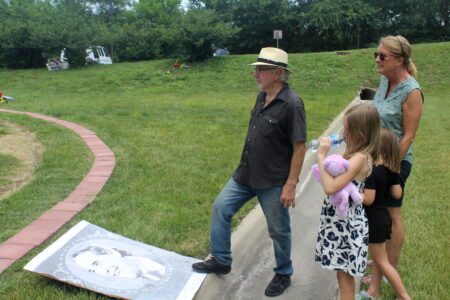Last words: Mark Twain’s final, stormy years are revisited

In this undated portrait released by The Mark Twain House & Museum, author Mark Twain is shown with his family at Hartford House in Hartford, Conn.
Redding, Conn. ? Mark Twain died here on April 21, a century ago. He was 74, and in failing health, his heart — his tobacco heart, he called it — so weak that he interrupted a restful cruise to Bermuda to return and die at the house on a hill built for him just two years earlier.
“Mark Twain is dead!” cried The San Francisco Examiner. “In those four words America announces to a weeping world the loss of her foremost literary man.”
It had been a quarter of a century since Twain’s classic “The Adventures of Huckleberry Finn,” but Twain remained the country’s most famous and beloved writer, the slouching, white-suited, frizzy-haired humorist and storyteller. The records of Twain’s final days were in bold headlines, with Twain’s doctor providing updates carried by news outlets around the world.
“Yesterday was a bad day for the little knot of anxious watchers at the bedside,” The Associated Press reported just before his death, adding that health concerns had led Twain to cut his smoking from 20 cigars a day to four.
“No deprivation was a greater sorrow to him. He tried to smoke on the steamer while returning from Bermuda, and only gave it up because he was too feeble to draw on his pipe. Even on his deathbed, when he had passed the point of speech and it was no longer certain that his ideas were lucid, he would make the motion of waving a cigar, and, smiling, would expel empty air from under the mustache still stained with smoke.”
Twain had suffered a decade of trials. He lost his beloved wife, Olivia, and two of his children, one of whom — Jean– died suddenly at the end of 1909, a tragedy that led Twain to vow he would never write again. Bad investments had forced him out of his eccentric Victorian mansion in Hartford and brought him to Redding, where he lived in a Tuscan-style house he named Stormfield, in part for his story “Extract from Captain Stormfield’s Visit to Heaven.”
Age saddened, but did not silence him. He was a leading opponent of the war in the Philippines and other military actions by the emerging American empire. He composed some of his toughest short pieces, such as the novella “The Man That Corrupted Hadleyburg,” or his mocking inquiry into Christian Science and an even harder hit on religion in “Letters From the Earth,” in which Satan documents the follies of man’s worship.
“He prays for help, and favor, and protection, every day; and does it with hopefulness and confidence, too, although no prayer of his has ever been answered,” Satan reports.
Contradictory soul
Mark Twain, the pen name Samuel Langhorne Clemens concocted for himself, was a serious man who couldn’t help but make folks laugh. As surely as Benjamin Franklin was the founding father who “winks” at us, as biographer Walter Isaacson once wrote, Twain’s eye catches ours like no other “classic” American author.
He is unstuffy, one of us. The line that begins Chapter 1 of “Huck Finn” (“You don’t know about me without you have read a book by the name of ‘The Adventures of Tom Sawyer’; but that ain’t no matter”) seems no less cheeky and disruptive than it did 125 years ago. Favorite maxims such as “an uneasy conscience is a hair in the mouth” need no updating or explanation.
Born in Florida, Mo., in 1835, and raised, for the most part, in Hannibal, Twain was bred in a border state, sharpened in the West and polished in the East. He told wild tales, wrote merciless parodies and made poetry out of his rustic youth. He worked as a river pilot on the Mississippi (according to river pilots, the author once explained, “mark twain” means the water is at a safe depth to navigate), a journalist in San Francisco and carried on everywhere from New Orleans to Nevada.
Twain, by nature, was a contradictory soul, a drinker and freethinker who married a proper Christian; a satirist and protester who wanted to be loved. The young Twain, like Huck Finn, may have dreaded home and hearth, but the elder author had warmed to a steady roof over his head.
“The Redding house was a dream home,” says biographer Michael Shelden, author of “Mark Twain: Man in White,” published this spring. “He had been without a proper home for well over 10 years, because he had to leave the house in Hartford. For all that time, he was a wanderer.”
Lured to Redding by author-versefier Albert Bigelow Paine, who became his biographer and neighbor, Twain lived a modern life. His house in Hartford was among the first private residences to have a telephone. In Redding, he had his own heating system and water supply. He was so fascinated by new technology that he happily let himself be filmed by Thomas Edison, ambling in front of his home and puffing a cigar. The electricity system was so bright that residents were reminded of the glow given off by an all-night factory.
“This is a man who wanted to be a part of the future, who wondered what the world would be like, not so much out of fear, but because he was excited about it,” Shelden says.
End days
Until the death of his daughter, Twain was a social man. He befriended several local schoolgirls and dubbed them the “angelfish.” He chatted with farmers and hosted great names from out of town, such as Helen Keller, whose caretaker, Annie Sullivan, Twain helped immortalize by giving her the nickname that became the title of a play and movie, “The Miracle Worker.”
Twain worked hard to set his story down. He not only cooperated with a biographer, but wrote hundreds of pages for a planned autobiography. At the same time, he became obsessed with Shakespeare and the latest theories over whether the Bard even existed, tickled that so little was known about the life of a writer he acknowledged as his superior.
“When Shakespeare died in Stratford it was not an event,” Twain wrote. “It made no more stir in England than the death of any other forgotten theater-actor would have made. Nobody came down from London; there were no lamenting poems, no eulogies, no national tears, there was merely silence, and nothing more.”
Twain knew death well and thought closely about it. He told jokes, of course (“the report of my death was an exaggeration”; “there is no humor in heaven”), but also reflected. Death was a challenge (“dying is nothing to a really great and brave man”) and a conclusion. It was a relief and a responsibility, especially for the famous.
“A distinguished man should be as particular about his last words as he is about his last breath,” he noted. “He should write them out on a slip of paper and take the judgment of his friends on them. He should never leave such a thing to the last hour of his life, and trust to an intellectual spurt at the last moment to enable him to say something smart with his latest gasp and launch into eternity with grandeur.”
Twain’s final words were brief, abbreviated, unwritten, uncertain. Laying in his death bed, he indicated a couple of unfinished manuscripts and whispered to Paine, his biographer, “Throw away.” Hours later, he held the hand of his remaining child, Clare, told her goodbye, and added, apparently, “If we meet …”
What remained, according to Paine, was a “fluttering sigh, and the breath that had been unceasing through seventy-four tumultuous years had stopped forever.”







